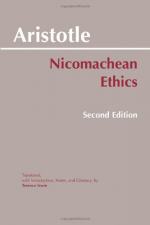
|
| Name: _________________________ | Period: ___________________ |
This test consists of 5 multiple choice questions, 5 short answer questions, and 10 short essay questions.
Multiple Choice Questions
1. Aristotle says that the magnanimous man cares more for what than for people's opinions?
(a) Respect.
(b) Truth.
(c) Fame.
(d) Money.
2. What determines, according to Aristotle's arguments in V.8, the justice or injustice of one's actions?
(a) Whether or not it deals with the community.
(b) Whether or not it deals with the whole person.
(c) Whether or not it is done willingly.
(d) Whether or not it is reciprocated.
3. What is a suitable category, in Aristotle's view, in which to place the feeling of shame?
(a) Conditional values.
(b) Feelings.
(c) Virtues.
(d) Vices.
4. Which sort of political justice is most universal in Aristotle's view?
(a) Empirical.
(b) Conventional.
(c) Contractual.
(d) Natural.
5. Deliberation is, for Aristotle, principally about the things to be done by whom?
(a) The community.
(b) Others.
(c) The state.
(d) Oneself.
Short Answer Questions
1. By human excellence, Aristotle means what?
2. In the opinion of Aristotle, what is the governing and most masterful art under which all others fall, according to I.2?
3. What is the difficulty Aristotle cites concerning the praise and blame of the moral quality of the actions of others?
4. Aristotle states that one suffers injustice willingly in what situation?
5. Who, in the opinion of Aristotle, is benefited by a stingy person?
Short Essay Questions
1. What are the conditions Aristotle gives for properly calling someone happy in Book I, Chapter 9, and why does he give these?
2. What is the relationship of virtues to extremes of excess and deficiency in the philosophy of Aristotle?
3. According to Aristotle, in what way is justice reciprocal, and why?
4. Why does Aristotle say that the things deliberated about are not ends?
5. What is the relationship that Aristotle cites as existing between opposites in coming to know what is or is not the right way for a thing to be, such as health?
6. What is the relationship that Aristotle claims exists between the virtues of courage and temperance?
7. In the view of Aristotle, what is the opinion of the temperate person towards the pleasures in which the intemperate indulge?
8. What does Aristotle mean by saying that every art, inquiry, action, and choice aims at some good?
9. In what way does Aristotle claim gentleness (or mildness) is related to the virtues concerned with honor and magnanimity?
10. What is the tripartite distinction in the soul that Aristotle makes in Chapter 13 of the first book?
|
This section contains 1,062 words (approx. 4 pages at 300 words per page) |

|




